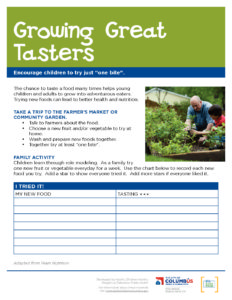Family Engagement
Early childhood wellness begins at home. Young children learn how to take care of themselves by watching the adults in their lives them take care of themselves. Parents who live healthy, active lives are likely to pass these values on to their children. Parents and caregivers make decisions about what foods to buy and how they are prepared. When families and child care providers both value wellness, young children are surrounded by adults that encourage them to be healthy.
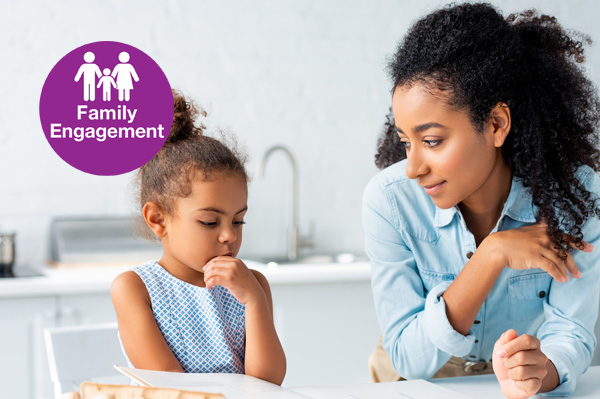
For parents to be successful in creating this “culture of wellness” for their children, their communities must have the resources needed to achieve their best health. In Cuyahoga County, many parents have busy schedules that force them to choose between providing for their child and interacting with their child. Financial responsibilities, lack of transportation, and poor support networks can make the healthy choice a difficult choice for many families.
Family Engagement | Our Goal:
Early Ages Healthy Stages will support and elevate the role of early care and education providers and other direct service providers in engaging family’s needs.
Family Engagement | Strategies for Change: EAHS is working to implement the following strategies to change the landscape of family engagement for all young children.
The problem. Families are not engaged in early childhood health. When early care and education providers create opportunities for family engagement and involvement with the program, family background, parent education, and income play a large role in family participation (McWayne, 2014). 1 in 3 families of children ages 0-6 in Cuyahoga County live in poverty (Children, 2010). Families with low income have high levels of emotional investment in their children, but do not always have the support to overcome the challenges of poverty (Bierman, 2017).
- Our Objectives: What we will do.
- Our Actions: How we will do it.
- Our Outcomes: How we will measure success.
Family Engagement | Objective 1. By December 31st, 2020, Early Ages Healthy Stages Coalition will collaborate with partner agencies to gather and fill gaps in parent education materials to increase the awareness of Adverse Childhood Experiences (ACES) and promote resiliency.
- Engage parents and families in focus groups and forums.
- Connect with current and potential partners to develop an inventory of tools and materials available for social emotional health promotion.
- Fill any identified gaps in materials.
- Collaborate with partners on ongoing social marketing campaign for early childhood social emotional health.
- Tracking the number of focus groups and forums held.
- Tracking the number of ECE programs using the materials.
- Our Objectives: What we will do.
- Our Actions: How we will do it.
- Our Outcomes: How we will measure success.
Family Engagement | Objective 2. By December 31st, 2020, Early Ages Healthy Stages Coalition will encourage and empower early care and education providers as well as organizations that work with young children to create parent support programs.
- Collect information about wrap around resources and ensure that providers have the information and expertise for supporting parents.
- Modify and/or develop a checklist/toolkit for providers to feel more comfortable engaging with parents.
- Recruit providers to hold parent meetings either in person or online as a means for group support.
- Connect families to transportation options.
- Tracking the number of ECE centers with onsite family support programs
- Tracking the number of ECE centers with online family support programs
- Measurement of attendance at family support programs
- Our Objectives: What we will do.
- Our Actions: How we will do it.
- Our Outcomes: How we will measure success.
Family Engagement | Objective 3. By December 31st, 2020, Early Ages Healthy Stages Coalition will engage community resources (schools, churches, parks, recreation centers, agencies) to partner in ongoing events and messaging for family engagement.
- Develop single focus, unified messaging for maximum impact and reach within multiple organizations and agencies.
- Encourage agencies to focus on a monthly message, saturating the messaging around that one topic throughout the community at one time.
- Ensure new themes around healthy living and early childhood wellness are adapted to fit the needs of the community and organizations.
- Tracking the number of community resources identified
- Tracking the number of community organizations and ECE programs participating in in family engagement messaging
- Our Objectives: What we will do.
- Our Actions: How we will do it.
- Our Outcomes: How we will measure success.
Family Engagement | Objective 4. By December 31st, 2020, Early Ages Healthy Stages Health Champions will develop strategies that will be used to create a family engagement toolkit for early childhood health and wellness.
- Engage families about important issues through focus groups and surveys
- Modify and/or develop and pilot a series of 4-5 family engagement tool kits that early care and education providers can use that include short trainings, activities, handouts, bulletin boards, and newsletter templates.
- Develop and pilot toolkits.
- Make toolkits available to providers.
- Development of a family engagement toolkit
- Measuring the number of ECE centers and/or organizations utilizing the toolkit
- Tracking the number of families reached
Family Engagement | Systems Change Success Story:
UPK family child care home providers, Robbie Willis and Cassandra Thompson, work together to provide resources that help their families thrive.
 Cleveland Heights-based family child care providers, Cassandra Thompson and Robbie Willis are long-time experts in family engagement. They inspire EAHS to think big when it comes to reaching families. Cassandra spends time getting to know families through Moms and Dads night out, and sharing important community resources with her families. One such resource, a friend at Towards Employment, led to a mom getting a degree and achieving their dream. Robbie has been a champion for EAHS since the beginning; doing healthy eating surveys so that parents can provide ideas and even taking family photos under the OHP banner at her summer family fun meeting!
Cleveland Heights-based family child care providers, Cassandra Thompson and Robbie Willis are long-time experts in family engagement. They inspire EAHS to think big when it comes to reaching families. Cassandra spends time getting to know families through Moms and Dads night out, and sharing important community resources with her families. One such resource, a friend at Towards Employment, led to a mom getting a degree and achieving their dream. Robbie has been a champion for EAHS since the beginning; doing healthy eating surveys so that parents can provide ideas and even taking family photos under the OHP banner at her summer family fun meeting!
At an EAHS meeting, Cassandra shared that she had benefited from the Cleveland Heights lead safe program in the past and was working to enroll more families of young children in the program. She invited Robbie to host their annual family engagement meeting for UPK and Step Up to Quality at the Cleveland Heights Library. Staff from the City of Cleveland Heights spoke to the families about the many programs in place to help families remove lead from their homes and keep their kids safe. Robbie asked EAHS staff to share information about how healthy eating, and safe play away from windows can keep kids safe from lead hazards. Cassandra and Robbie recognize that families who are struggling financially may have extra challenges when it comes to engaging with their kids. At the meeting, there was a speaker from Towards Employment who spoke about programs and services that range from getting families back on their feet, to helping parents achieve their career dreams. When it comes to getting families connected to resources, Cassandra says, “You have to open up your mouth and assist people. Help them out.”
Family Engagement Working Group:
Co-Facilitators: Jodi Yuhas, Noodle Soup and Denise Hallman, Ideastream
Family Engagement Activity Guides for Providers:
Family Engagement Strategic Planning Handouts:
Key Massages Handouts:
Sources:
Bierman, K. M. (2017). Parent Engagement Practices Improve Outcomes for Preschool Children. State College, Pennsylvania: Edna Bennett Pierce Prevention Research Center, Pennsylvania State University.
Cardiovascular Disease Prevention and Control: Interventions Engaging Community Health Workers (2015). Community Preventative Services Task Force. Retrieved from: https://www.thecommunityguide.org/sites/default/files/assets/CVD-Community-Health-Workers.pdf
Children, H. C. (2010). Adressing Childhood Obesity: A Priority for Ohio’s Business Community. Retrieved from Healthy Choices for Healthy Children: www.healthychoiceshealthychildren.org/index.php/resources
CPST, C. P. (2015, March March 8, 2017). Promoting Health Equity Through Education Programs and Policies: Center-based early childhood education. Retrieved from Community Preventive Services Taskforce: https://www.thecommunityguide.org/sites/default/files/assets/Health-Equity-Center-Based-Early-Childhood-Education_3.pdf
Daugherty, L. R. (2014). Families, Powered On Improving Family Engagement in Early Childhood Education Through Technology. Retrieved from RAND Corporation: http://www.rand.org/pubs/research_reports/RR673z5.html
Hackman, D. A., Farah, M. J., & Meaney, M. J. (2010). Socioeconomic status and the brain: mechanistic insights from human and animal research. Nature Reviews. Neuroscience, 11(9), 651–659. http://doi.org/10.1038/nrn2897
HIP-Cuyahoga, H. I. (2013, March March 1, 2017). Community Health Status Assessment for Cuyahoga County, OH. Retrieved from Health Improvement Partnership of Cuyahoga County: http://www.naccho.org/uploads/downloadable-resources/Full-CHACHIPCombined-3-20-13.pdf
Liaisons to the Community Preventive Services Task Force. (2017, June 09). Retrieved June 20, 2017, from https://www.thecommunityguide.org/task-force/liaisons-community-preventive-services-task-force
McWayne, C. a. (2014). Validation of a culture-contextualized measure of family engagement in the early learning of low-income Latino children. Journal of Family Psychology, 28, 260-266.
Merz, E. L. (2012). Associations among parental education, home environment quality, effortful control, and preacademic knowledge. Journal of Applied Developmental Psychology, 35, 305-315.
Petitclerc, A., Côté, S., Doyle, O. et al. ICEP (2017) Who uses early childhood education and care services? Comparing socioeconomic selection across five western policy contexts? 11: 3. doi:10.1186/s40723-017-0028-8
Stark, D. a. (2009). Family Engagement, Diverse Families, and Early Childhood Education Programs: A review of the literature. Retrieved from National Association for the Education of Young Children: https://www.naeyc.org/files/naeyc/file/research/FamEngage.pdf
Yoshikawa, H., Weiland, C., Brooks-Gunn, J., Burchinal, M. R., Espinoza, L. M., Gormley, W. T., Ludwig, J., Magnuson, K. A., Phillips, D., & Zaslow, M. J. (2013). Investing in our future: The evidence base on preschool education. New York, NY: Foundation for Child Development.
